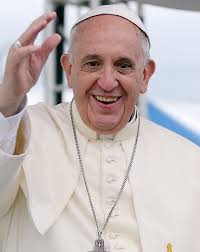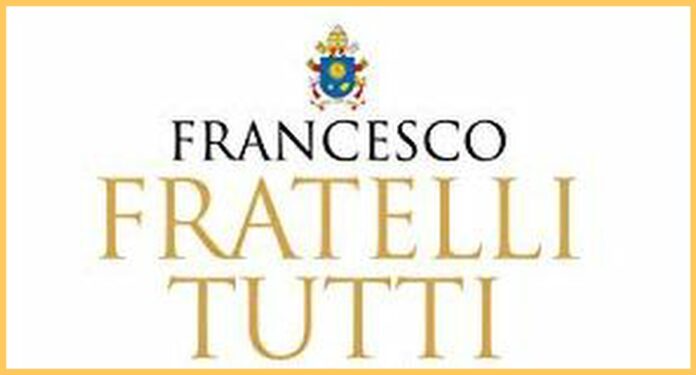This article from La Croix International throws light on the concept of ‘Social Friendship’, which is at the heart of “Fratelli tutti” and is relatively a new concept in Catholic theology
By Loup Besmond de Senneville | Vatican City
 When Pope Francis published his Fratelli tutti on October 4 some were surprised by the
When Pope Francis published his Fratelli tutti on October 4 some were surprised by the What exactly is social friendship?
Pope Francis gives several indications in Fratelli tutti to help define the term. “A love capable of transcending borders is the basis of what in every city and country can be called ‘social friendship’. Genuine social friendship within a society makes true universal openness possible,” he writes (FT, 99). The pope indicates that it is a quality to be implemented collectively. Another way of defining social friendship may be to compare it to fraternity.
“Fraternity is the solid basis for living ‘social friendship’,” noted Father Antonio Spadaro in an article published in the November issue of the magazine he edits, La Civiltà Cattolica. The Italian Jesuit pointed out that Francis expanded on the term in 2015 during a meeting with young people in Cuba. He recalled an incident from when he was the Archbishop of Buenos Aires and he visited a poor parish where the people, some not even Catholics, were working together on a building project.
“They were all different, yet they were all working for the common good. This is called social friendship, where everyone works for the common good,” the Argentine pope said at that youth gathering. “Where there is division, there is death: the death of the soul, since we are killing our ability to come together. We are killing social friendship. And this is what I’m asking you today: to find ways of building social friendship,” Francis exhorted the young people. Father Spadaro said it is precisely this common work beyond differences that the pope calls social friendship. In particular, it is something that “knows how to combine rights with responsibility for the common good” and respect “diversity” as a natural part of “radical fraternity”.
“This is much more than solidarity in the juridical sense of the term,” insisted Father François Euvé, director of the Paris-based review Études. The Jesuit theologian said the notion of social friendship always includes action. “We can connect it to the episode of the Good Samaritan,” he continued. “The Good Samaritan is helped by a stranger, if not an enemy. By rescuing this man by the side of the road, he demonstrates social friendship because, in fact, the inter-human relationship takes precedence over differences of conviction, theology, social class and so forth,” Euvé said. Pope Francis also dedicates a very large passage to the parable of the Good Samaritan in Fratelli tutti.
But where does term actually come from?
The pope has spoken often of “social friendship” from the very beginning of his pontificate. Yet the term is relatively new. “It is not a known or classic expression in theology,” confirmed Father Euvé. In fact, it never before appeared in the Church’s social doctrine. No pope has ever used it in the way Francis has. Furthermore, when it is found in Western philosophy, it’s in reference to a concept used by Rousseau and Montaigne, which refers in particular to the act of choosing one’s friends outside one’s family circle. To find these two words used in a theological context, you have to go to Latin America and go back a few years. More precisely, to the beginning of the 1980s, when the expression began to emerge.
One of the very first to use it was Pablo Sudar, a priest-theologian from the Diocese of Rosario in northeastern Argentina. He employs the concept in an article titled, “The face of the poor”, which was published in 1983 in Teologia, the theological journal of the Pontifical Catholic University of Argentina. In his article, Father Sudar addressed “people in their relationship with God”, linking social friendship and justice. “A person’s dignity is a work of social justice, which must be realized in ‘social friendship’, directing all their efforts towards the realization of each and every person, that is, towards the common good of society,” he wrote. “The ethical task implies the realization of justice, the exercise of rights and the fulfillment of duties,” Sudar noted.
“In the Christian vision, it also implies, ‘social friendship’ based on love between people, which finds its ultimate foundation in ‘fraternity’, since we are all children of the same father, who brings men and women together in equality and out of love,” he added. This reasoning can be found quite readily in Fratelli tutti.
Did Francis ever use the term before becoming pope?
Social friendship is one of the “most characteristic elements of the pope’s social thought”, said José Manuel Vidal, director of the news site Religion Digital. He pointed out in an article on the site that Francis often used the term when he headed the Archdiocese of Buenos Aires. “He preferred this expression to others that are usually ideologized, such as ‘reconciliation’ or ‘tolerance’,” Vidal noted. This was particularly the case when the then-Cardinal Bergoglio presided at the Te Deum in the Argentine capital in May 2006. The future pope spoke of “the transformative power of social friendship”, while condemning “the constant exclusion of those we believe to be against us” and “the unfortunate attitudes that lock us into the vicious circle of endless confrontation”.
Four years earlier, in front of more than a thousand people gathered at the Institute of the Sacred Heart in Buenos Aires, he also praised the idea of “social friendship”, insisting that it is a condition for “common coexistence”.
With permission form La Croix International

